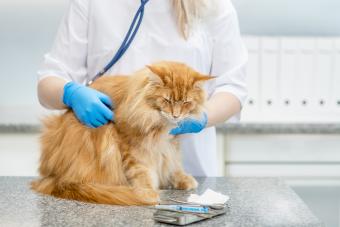
Antibiotics are prescribed to treat bacterial infections in both cats and humans, and when your pet is sick, it's natural to wonder if you can use leftover human antibiotics for cats. In some cases, you can, but some medications may put your kitty in danger. Before you give your cat your leftover medication, you must consult a veterinarian for the proper dosage and learn any safety concerns.
Three Safe Human Antibiotics for Cats
A cat's metabolism is extremely sensitive to antibiotics, even those formulated for veterinary use. Do not give your cat medications unless specifically directed by your veterinarian. Of antibiotics prescribed for humans, these three may be safe for cats:
- Amoxicillin: A penicillin-type drug and the most frequently prescribed antibiotic for cats
- Ampicillin: An older penicillin-type antibiotic
- Tetracycline: A broad-spectrum antibiotic
Even though these specific antibiotics may be safe for cats under some conditions, dosages giving to humans are typically much higher. If you give your cat antibiotics that were prescribed for you, the dosage could be way off. This is why it's essential to consult your veterinarian and tell them exactly what you are thinking about giving your cat - including the dosage on your label - before you give anything to your cat.
Amoxicillin and Ampicillin for Cats
In cats, amoxicillin and ampicillin are most often prescribed for infections of the respiratory system, urinary tract, eyes and ears. They may also be given to prevent infection from developing in a bite wound, or to treat an already infected wound.
Ampicillin, while less commonly used, can be effective against certain strains of bacteria that are resistant to other antibiotics.
Tetracycline for Cats
Tetracycline is typically prescribed to treat a tick-borne disease called ehrlichiosis. Tetracycline may interact with other medications and is not recommended for use in pregnant or nursing cats.
Proper Dosage
Your vet will need to weigh and examine your cat to prescribe the proper dosage. Factors that determine dosage include your cat's weight, their symptoms, overall medical condition, and any other medications they might be taking.
Possible Side Effects of Human Antibiotics Use in Felines
All medications can potentially cause unpleasant side effects, but this should be carefully considered, especially if you're using your own medications for your kitty.
Amoxicillin and Ampicillin Side Effects in Cats
Common side effects of amoxicillin and ampicillin include:
- Upset stomach
- Vomiting
- Diarrhea
- Drooling

Tetracycline in Cats Side Effects
Tetracycline can cause nausea and diarrhea, as well as:
- Difficulty swallowing
- Tooth discoloration
- Sensitivity to the sun
- Delayed bone growth and healing
- Damage to the liver or kidneys
Signs Your Cat Is Having an Allergic Reaction to Antibiotics
Call your vet right away if your cat shows signs of an allergic reaction. The signs of an allergic reaction include:
- Severe skin rash
- Itching
- Hives
- Swelling of the face, tongue or throat
- Difficulty breathing or swallowing
- Dizziness
Antibiotic Treatments to Avoid With Cats
There are several antibiotic treatments you should avoid providing to your cat. Antibiotics to avoid at all times include:
Topical Antibiotics
The human antibiotics that pose the greatest danger for cats are topical antibiotic ointments such as Neosporin or Bacitracin. A cat licking the ointment off of a wound can ingest enough of the topical antibiotic to cause serious illness or even death.
Fluoroquinolones
Also, a class of antibiotics called fluoroquinolones may cause seizures in cats, according to the ASPCA's Animal Poison Control Center. These synthetic broad-spectrum antibacterial drugs are marketed under brand names like Baytril, Cipro, and Levaquin. In addition, The Merck Veterinary Manual notes adverse effects of this class of drugs, especially Baytril, on cats include acute retinal degeneration, which can lead to blindness.
Common Signs of Poisoning From Antibiotics
Even veterinary antibiotics can be toxic to cats if they're not properly administered. Common signs of poisoning from drugs, a drug overdose or any other toxic substance, include:
- Drooling
- Lack of appetite
- Vomiting
- Diarrhea
- Discolored teeth
- Inappropriate drinking or urinating
- Skin lesions
- Tremors
- Seizures
Call your vet immediately if you notice any of these symptoms after giving antibiotics to your cat.
What Else You Should Know About Human Antibiotics for Cats
Follow your vet's instructions for giving your cat their medication. Even if your kitty seems back to their old self, continue the full course of treatment. That will reduce chances of the infection recurring and help your cat stay in perfect health. Taking the full round of antibiotics will also reduce the risk of becoming resistant to antibiotics.







